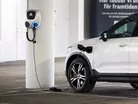Volvo uses circular business principles to low emissions

Supporting its long term goal to become a circular business by 2040, Volvo Cars aims to make annual savings of US$118.29mn and reductions of 2.5 million tonnes in carbon emissions from 2025 by harnessing circular business principles.
“Volvo Cars has one of the most ambitious climate plans in the car industry, and if we are to reach our goals, we need to embrace the circular economy. This requires us to rethink everything we do and how we do it. We put a strong focus on integrating sustainability into the way we think and work as a company, and we are making it as important as safety has always been to us,” said Anders Kärrberg, head of global sustainability at Volvo Cars.
Becoming a circular business
In order to become a circular business by 2040, Volvo Cars believes that every part in its cars should be designed, developed and manufactured to be used and re-used, by itself or its suppliers.
Volvo cars wants to optimise its use f materials, components and cars, as well as eliminate waste in the process, by not only focusing on resource efficiency, but retaining the value created in materials and components for as long as possible during the life cycle. By doing this Volvo Cars will create value savings, new revenue streams, and lower its environmental impact.
Achievements to date
In 2020 40,000 parts were remanufactured by Volvo Cars - such as gearboxes and engines - saving almost 3,000 tonnes of CO2 emissions. By 2025 Volvo Cars aims to more than double its remanufacturing operations.
In addition, to ensure that valuable materials are kept in circulation, Volvo Cars recycled 95 per cent of its production waste in 2020, including 1760,000 tonnes of steel avoiding the generation of 640,000 tonnes of CO2.
Volvo Cars also became a member of the Ellen MacArthur Foundation, the world's leading circular economy network.
“We welcome Volvo Cars’ commitment to design, develop and manufacture their products to be used and re-used. It is very encouraging to see the link being made between circular solutions, business strategy and a reduction in carbon emissions. The circular economy offers companies a framework for viable long-term growth that also benefits society and the environment,” said Joe Murphy, network lead at the Ellen MacArthur Foundation
New business models such as giving electric vehicle batteries a second life are important from a circular business perspective. By using batteries in energy storage applications outside of cars, new revenue streams and cost savings can be realised while also extending the batteries’ lifecycles.
For more information on manufacturing topics - please take a look at the latest edition of Manufacturing Global.
- The University Manufacturing Circuit Boards from LeavesSustainability & ESG
- Schneider Electric's Commitment to Sustainable ManufacturingSustainability & ESG
- Lenovo & Saudi Alat Building Green Manufacturing FacilitySustainability & ESG
- Nissan Brings Biodiversity to the Factory through RewildingSustainability & ESG

